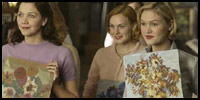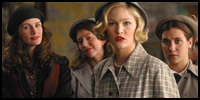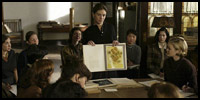
 |
|
Mona Lisa Smile (2003) Cast: Julia Roberts, Kirsten Dunst, Julia Stiles, Maggie Gyllenhaal, Ginnifer Goodwin, Dominic West, Topher Grace, Marcia Gay Harden, Juliet Stevenson, John Slattery, Marian Seldes, Ebon Moss-Bachrach, Jordan Bridges, Donna Mitchell, Laura Allen, Terence Rigby, Tori Amos 2003 – 119 minutes Rated: Reviewed by Dustin Putman, December 19, 2003.  Since "Mona Lisa Smile" is about a free-thinking college professor in the 1950s who motivates all of her female students to resist the conformities placed upon them and make something special of their lives, you would think that a bulk of the running time would be spent in the classroom, where this inspiration stems. Instead, there are four classroom scenes in total, thus making the whole basis of the film a hard one to swallow. It's only one of many problems in a progressively uneven screenplay, by Mark Rosenthal (and Lawrence Konner (2001's "Planet of the Apes"), that turns its every character into a cliche and its every plot development into an easy preconception.
Since "Mona Lisa Smile" is about a free-thinking college professor in the 1950s who motivates all of her female students to resist the conformities placed upon them and make something special of their lives, you would think that a bulk of the running time would be spent in the classroom, where this inspiration stems. Instead, there are four classroom scenes in total, thus making the whole basis of the film a hard one to swallow. It's only one of many problems in a progressively uneven screenplay, by Mark Rosenthal (and Lawrence Konner (2001's "Planet of the Apes"), that turns its every character into a cliche and its every plot development into an easy preconception.
 In the Fall of 1953, Katherine Watson (Julia Roberts) moves from her Los Angeles stomping ground to New England to teach art history at Wellesley, a prestigious women's university. Planning on instructing the future leaders of the country, Katherine is given a rude awakening when she discovers that her students are using their further education as nothing more than a bridge to marriage and having a family.
In the Fall of 1953, Katherine Watson (Julia Roberts) moves from her Los Angeles stomping ground to New England to teach art history at Wellesley, a prestigious women's university. Planning on instructing the future leaders of the country, Katherine is given a rude awakening when she discovers that her students are using their further education as nothing more than a bridge to marriage and having a family.
 In this post-war era, nothing more is expected of women, and in the case of uptight student Betty Warren (Kirsten Dunst), who is about to be married to a lawyer (Jordan Bridges), she is happy to follow such a path. Katherine's other pupils include brainy Joan Brandwyn (Julia Stiles), who is torn between her engagement to Tommy (Topher Grace) and a chance to study law at Yale; promiscuous Giselle Levy (Maggie Gyllenhaal), who is carrying on an affair with Professor Bill Dunbar (Dominic West) and several other men; and the chubby Constance Baker (Ginnifer Goodwin), who has begun to believe she is destined to become an unhappy spinster. It's an uphill battle Katherine must face in order to get these young women to realize they have the ability to go further in their life, but it is one that she believes is worth fighting for.
In this post-war era, nothing more is expected of women, and in the case of uptight student Betty Warren (Kirsten Dunst), who is about to be married to a lawyer (Jordan Bridges), she is happy to follow such a path. Katherine's other pupils include brainy Joan Brandwyn (Julia Stiles), who is torn between her engagement to Tommy (Topher Grace) and a chance to study law at Yale; promiscuous Giselle Levy (Maggie Gyllenhaal), who is carrying on an affair with Professor Bill Dunbar (Dominic West) and several other men; and the chubby Constance Baker (Ginnifer Goodwin), who has begun to believe she is destined to become an unhappy spinster. It's an uphill battle Katherine must face in order to get these young women to realize they have the ability to go further in their life, but it is one that she believes is worth fighting for.
 Directed by Mike Newell (1999's "Pushing Tin"), "Mona Lisa Smile" has been appointed a top-flight cast of young talents, but misuses each of them as an archetype rather than a full-bodied character. Such is the downfall of most of the film, which holds great promise and a number of effective moments, but goes the lazy route and feels like nothing more than a female version of 1989's "Dead Poets Society."
Directed by Mike Newell (1999's "Pushing Tin"), "Mona Lisa Smile" has been appointed a top-flight cast of young talents, but misuses each of them as an archetype rather than a full-bodied character. Such is the downfall of most of the film, which holds great promise and a number of effective moments, but goes the lazy route and feels like nothing more than a female version of 1989's "Dead Poets Society."
 The script is the biggest culprit, as the movie moves all over the places and never finds a clear rhythm. The classroom scenes are fascinating and convincing, particularly one in which a fed-up Katherine presents them with a slideshow of demeaning advertisements that give women the impression that they are useful for nothing but cooking and cleaning, but there are far too few of them. The rest of the time is spent developing half-baked subplots that lack structure and, in many cases, a satisfactory payoff.
The script is the biggest culprit, as the movie moves all over the places and never finds a clear rhythm. The classroom scenes are fascinating and convincing, particularly one in which a fed-up Katherine presents them with a slideshow of demeaning advertisements that give women the impression that they are useful for nothing but cooking and cleaning, but there are far too few of them. The rest of the time is spent developing half-baked subplots that lack structure and, in many cases, a satisfactory payoff.
 Katherine, although played well by the always capable Julia Roberts (2001's "Ocean's Eleven"), feels like more of an enigmatic stereotype than a three-dimensional character. She seems to have one goal—to inspire her students while fighting the system laid upon women in the 1950s—but in being so set in her own ways she comes off as more rigid than open-minded. It doesn't help that she often dresses and acts more like someone from 2003 than 1953. Taking up too much of the picture's running time are two romantic subplots, one with long distance boyfriend Paul (John Slattery) and another with Bill, that hold neither conviction nor heat and go nowhere. In the world of "Mona Lisa Smile," all of the male characters are, in fact, lunkheads.
Katherine, although played well by the always capable Julia Roberts (2001's "Ocean's Eleven"), feels like more of an enigmatic stereotype than a three-dimensional character. She seems to have one goal—to inspire her students while fighting the system laid upon women in the 1950s—but in being so set in her own ways she comes off as more rigid than open-minded. It doesn't help that she often dresses and acts more like someone from 2003 than 1953. Taking up too much of the picture's running time are two romantic subplots, one with long distance boyfriend Paul (John Slattery) and another with Bill, that hold neither conviction nor heat and go nowhere. In the world of "Mona Lisa Smile," all of the male characters are, in fact, lunkheads.
 It is a testament to the abilities of the younger cast members that they retain poise and dignity in the face of such commonplace roles. Kirsten Dunst (2002's "Spider-Man") is delicious fun as the outwardly snotty Betty, who isn't so much a bitch as she is an angry product of the teachings of her traditional mother. Dunst nicely injects Betty with a level of humanity that likely wasn't apparent in the screenplay, but her amazing 180-degree turnaround at the end feels like more of a necessity to formula than a natural progression. Julia Stiles (2003's "A Guy Thing") is quietly touching as the intelligent Joan, who wants a career but would rather have a family; unfortunately, her character is maddeningly sidestepped near the conclusion and lacks any sort of character arc. Maggie Gyllenhaal (2003's "Casa de los Babys") brings acidic wit and an undercurrent of hurt to the resident slut, Giselle, but there is obviously something much darker and serious going on with her character than the film has the courage to face. And newcomer Ginnifer Goodwin (TV's "Ed") has some good moments as the low self-esteemed Constance, but comes off as a little too abrasive in some of her line readings.
It is a testament to the abilities of the younger cast members that they retain poise and dignity in the face of such commonplace roles. Kirsten Dunst (2002's "Spider-Man") is delicious fun as the outwardly snotty Betty, who isn't so much a bitch as she is an angry product of the teachings of her traditional mother. Dunst nicely injects Betty with a level of humanity that likely wasn't apparent in the screenplay, but her amazing 180-degree turnaround at the end feels like more of a necessity to formula than a natural progression. Julia Stiles (2003's "A Guy Thing") is quietly touching as the intelligent Joan, who wants a career but would rather have a family; unfortunately, her character is maddeningly sidestepped near the conclusion and lacks any sort of character arc. Maggie Gyllenhaal (2003's "Casa de los Babys") brings acidic wit and an undercurrent of hurt to the resident slut, Giselle, but there is obviously something much darker and serious going on with her character than the film has the courage to face. And newcomer Ginnifer Goodwin (TV's "Ed") has some good moments as the low self-esteemed Constance, but comes off as a little too abrasive in some of her line readings.
 The most poignant and interesting character, not to mention the only one who isn't a stereotype, belongs to the wonderful Marcia Gay Harden (2003's "Mystic River"), who brings a shattering reality to her part as Nancy. A spinster and fellow Wellesley professor Katherine rooms with, Nancy has unhappily come to terms with being alone for the rest of her life. In a moving, understated late scene, Katherine tries to persuade Nancy to go out for a night on the town, but her attempt is lost on a woman who would rather stay home and watch a game show on television. There is more going on with Harden's Nancy than meets the eye, and the film would have been better off had it followed her life, rather than the less interesting Katherine.
The most poignant and interesting character, not to mention the only one who isn't a stereotype, belongs to the wonderful Marcia Gay Harden (2003's "Mystic River"), who brings a shattering reality to her part as Nancy. A spinster and fellow Wellesley professor Katherine rooms with, Nancy has unhappily come to terms with being alone for the rest of her life. In a moving, understated late scene, Katherine tries to persuade Nancy to go out for a night on the town, but her attempt is lost on a woman who would rather stay home and watch a game show on television. There is more going on with Harden's Nancy than meets the eye, and the film would have been better off had it followed her life, rather than the less interesting Katherine.
"Mona Lisa Smile" means well, but the very old-fashioned nature of its plot seems irrelevant to today's times. Sure, as viewers, we can watch it and be thankful that things have gotten better for women, but it doesn't really hold much insight into the topic. The rushed ending, which leaves story threads hanging in the balance in order to have a tidy, would-be heartwarming final scene, seals the deal. "Mona Lisa Smile" is a motion picture that strives to be important and gain respect, but is without the sharp intelligence and backbone to achieve such a feat. |
© 2003 by Dustin Putman |














